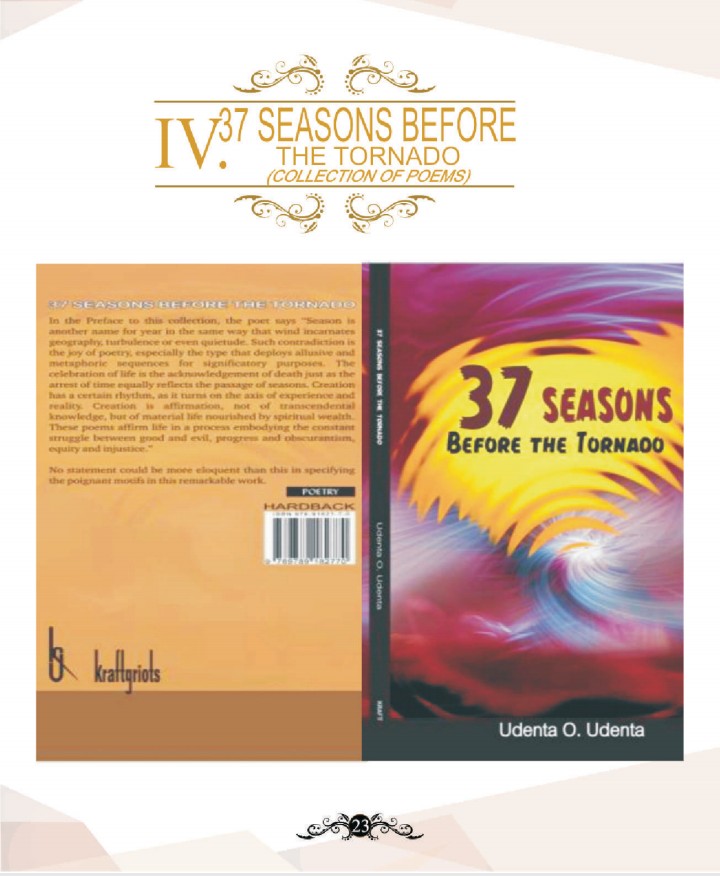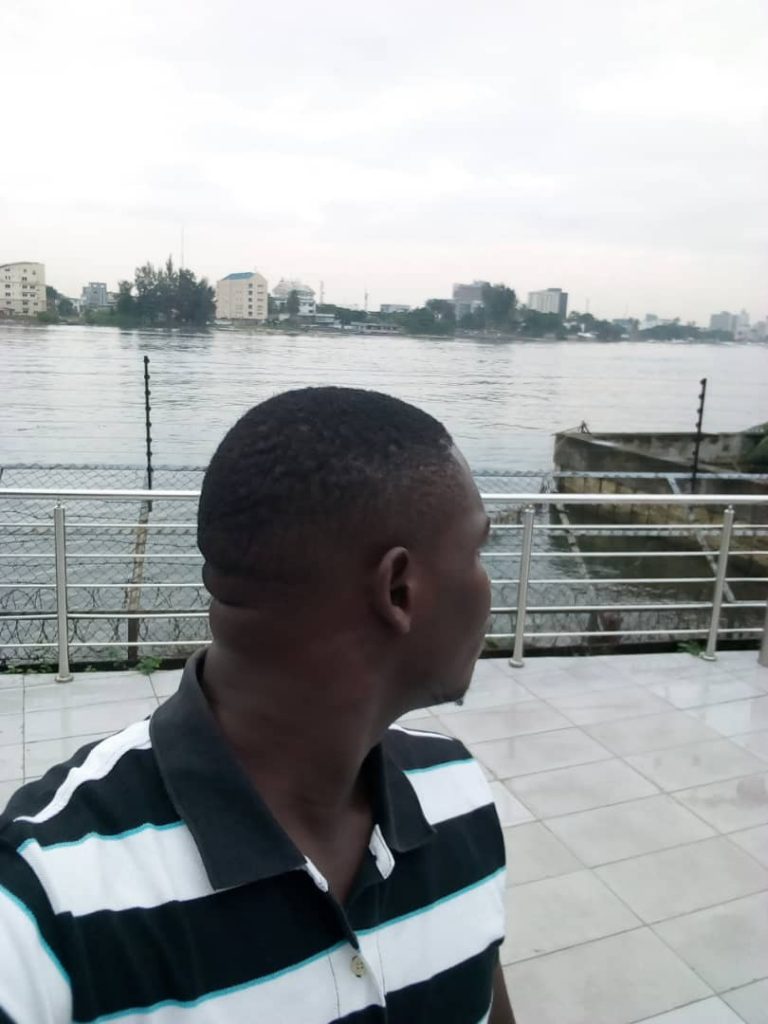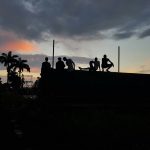Of Prophecy , Rage & Blood: Udenta O. Udenta’s 37 Seasons…

How does one read Udenta O Udenta’s calligraphy of expedient revolution without inhaling the contagious potency of prophecy? Not since the time of Christopher Okigbo’s Path of Thunder have I read a collection of poems as prophetic as Udenta’s 37 Seasons Before The Tornado. With a title as apocalyptic as ever, 37 Seasons Before The Tornado is a nuanced tapestry of sociopolitical trajectories in the poet-prophet’s beloved nation. One gets a feeling of astute loyalty and dedication to the cause of nationhood through the poet’s dreams and daydreams and nightmares and trances, where he envisions the liberation of his nation from the shackles of “monsters of the whirlpool” that have been let loose “like carrion-eaters” who mangle the “flesh of their victims.”
In my many years of reading and reviewing books, especially poetry collections, I have always made sure to avoid obscure poems. With the many wahala in our Nigeria today, I feel I do not have the extra time and patience to start cracking poetic puzzles strung up by esotericists. That was my initial approach to the reading of this well crafted collection. One or two lines into the book, I had already marked it down as a book I’d never review because I had thought it difficult, coupled with the fear that the author, a seasoned scholar for whom words are mathematics, must have clothed the lines in difficult robes. Not until a voice roared in my head, saying, dear reader, clear your eyes of the glaucoma of misunderstanding and read again. I began afresh, lo, what I had thought obscure were but simple symbols and images employed to accompany a poet’s vision to the final destination of uprising. All one needs is a humane approach in reading and the symbols and images yield themselves to disturbing revelations.
37 Seasons therefore lends itself to stylistic inquiry, the finding of which is anchored on the fact that the poet’s nation was approaching its 37th anniversary of independence as at the time of the final writing and eventual publication of this work in 1997. This edition has been slightly revised and reissued; mostly due to the poor circulation of the earlier print, largely orchestrated by the poet’s eventual incarceration by the Sani Abacha’s brutish regime. Little wonder the motif of revolution pervades the entire collection and the leadership structure being referred to in the entire collection points towards the military. The junta must have felt indicted and must been disturbed to the extent of attempting to silence the poet and activists whose newspaper column during the military era churned out unsettling pieces aimed at the powerful. There are even signposts of such allusions like “helmeted ants” (ants are known for moving in columns, but these ones are wearing helmets, alright?) “Maradona” (nickname of a popular despot), “wizards” (who are known for their obsession with blood; an obsession that characterized all military regimes in Nigeria, for which Fela sang Sorrow, Tears and Blood – dem regular trademark), etc.
Post independent Nigerian Literature made no pretence about the traumatizing effects of successive military regimes and numerous writers and poets, at various times, have had to relay their own experiences and/or notions of those days – from Okigbo to Osundare to Chimamanda – military despotism have had mighty representations in all genres but Udenta did not just write about their brutality like others, he predicted, and correctly too, in 1997, that the end of military rule in Nigeria would begin from “the second moon of the sixth season” (Abacha was the sixth military leader, he died in the second lap of his seven years reign), prophecy, I say, prophecy!
The poet-prophet had earlier warned in the first few pages of the book thus: “Father, look at the stampede/ among the limpid dances,/ the TORNADO lurking on/ the edges of the village square… (15). One recalls Achebe’s apt prediction of a military coup in Nigeria in A Man of the People (1966) which occurred two days after the book was published. It got people asking if he knew about the plans and some even accused him of being part of it. What then should be said of Ayi Kwei Armah’s own prediction in Ghana in The Beautyful Ones are not yet Born that also came to pass within weeks. With Udenta’s 37 Seasons, therefore, a discerning mind would realize that a conscious, unbiased and deep-thinking follower of his/her nation’s sociopolitical activities can comfortably predict its direction or future events. Did Okigbo not predict the Nigerian civil war in Path of Thunder long before it started?
In “Incantations on the third coming” the poet-prophet warns thus:
“Carefully, carefully look at the thickening horizon
And the dry cough of midday thunder
And feel if sizzling rain
Will not turn into run away deluge
Gather, therefore, all the homestead utensils
Leave not the cooking pots and earthenware jugs
For I am frightened of the coming flood” (34)
Then in the “Season of the deluge,” the vision materializes into full scale militant action by the people, against the oppressing cabal:
“The Third Coming
was into its second moon
when a defender’s tackle
brought down a dribbler’s rush
in a fair play, not a foul charge
Spectators are coming into central pitch
cheering the awaited reversal
sideliners are caught in rapturous huggings
for once are the traps well sprung” (37)
Sometimes, through football or soccer game images, at other times, through well contextualized symbols of dance and initiations and trance, Udenta was able to raise a sandcastle of age-long misrule, injustice and unhealthy class system, and sends it crashing through the subtle cadences of egalitarian uprising, a blood rush, the people’s apocalyptic crushing of their oppressors; an affirmation of the Marxist’s creed.
In the run up to the canonization of contemporary works, this collection meritoriously earns a right of place in the catalogue of timeless classics for here is a testament of an event foretold, a recording of the forthcoming deluge; in Nigeria and other African nations with whom we share oppression, and here is a summation, in style and rendition, of Okigbo-Soyinka, Okara-Clark, Achebe-Ngugi, Osundare-Udeozo and Ojaide-Ohaeto et al, and in theme, keeps faith with T.S Eliot’s theory of objective correlative. Udenta, I must say, is a remarkable poet.
Get this work, read it and thank me later with a bottle of beer!
About the Author
Rapper, Essayist, Poet and Playwright, Ifesinachi Nwadike holds a BA and MA in Literature from Imo State University and University of Ibadan respectively. A 2018 Ebedi International Writers Residency alumni, his works have appeared in The Sun Review, ANA Review, Ake Review, Praxis Magazine, Naij.com and elsewhere.
He is a 2FACE IDIBIA addict.





Nice one. 2kool
Jisie ike